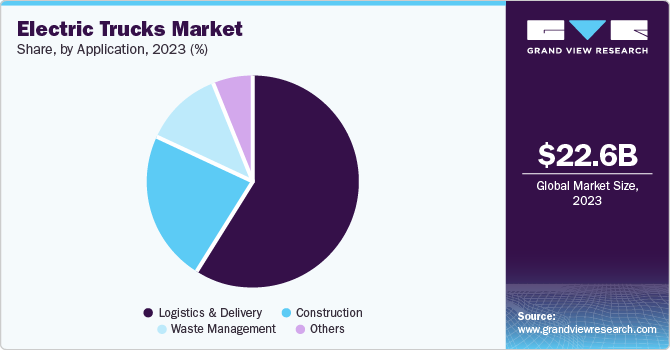Electric Trucks Market Demand Propelled by Rising Fuel Costs
The electric trucks market is witnessing rapid acceleration, fueled by growing environmental concerns, government regulations, and technological advancements in battery and charging systems.
The global electric trucks market reached an estimated value of USD 22.61 billion in 2023. Projections indicate a substantial increase to USD 124.97 billion by 2030, demonstrating a Compound Annual Growth Rate (CAGR) of 27.1% from 2024 to 2030. This rapid expansion is driven by a confluence of factors, including the increasing demand for sustainable logistics solutions, advancements in battery capacities and charging infrastructure, and the implementation of stringent environmental regulations.

For instance, the International Energy Agency (IEA)'s Global EV Outlook 2023 report highlighted that over 60,000 medium- and heavy-duty electric trucks were sold globally in 2022, signaling significant demand from emerging markets. Furthermore, continuous innovations in battery technology, coupled with economies of scale, have led to considerable reductions in battery costs. This makes electric trucks increasingly competitive with their internal combustion (IC) engine counterparts. As the need for environmentally friendly logistics solutions grows, the sales of electric trucks are expected to maintain their substantial momentum throughout the forecast period.
Key Market Highlights:
- North America dominated the global market in 2023, holding a significant revenue share of 37.6%.
- The U.S. accounted for the largest share of the North American regional market in 2023.
- By vehicle type, light-duty trucks led the market with a revenue share of 64.0% in 2023.
- In terms of propulsion, battery electric vehicles accounted for the largest market share in 2023.
- Regarding vehicle range, trucks with a range of up to 300 miles held the highest market share in 2023.
Order a free sample PDF of the Electric Trucks Market Intelligence Study, published by Grand View Research.
Market Size & Forecast
- 2023 Market Size: USD 22.61 Billion
- 2030 Projected Market Size: USD 124.97 Billion
- CAGR (2024-2030): 27.1%
- North America: Largest market in 2023
- Asia Pacific: Fastest growing market
Key Companies & Market Share Insights
Some key companies involved in the electric trucks market include AB Volvo, BYD Company Ltd., and Daimler Truck AG, among others. These industry leaders collectively hold the largest market share and play a significant role in shaping industry trends. Their financial performance, strategic roadmaps, and product portfolios are analyzed to understand the complexities of the supply network.
AB Volvo, a multinational vehicle manufacturing company headquartered in Gothenburg, operates through various segments, with Volvo Trucks being one of the largest manufacturers of heavy-duty trucks globally. The company's comprehensive electric vehicle (EV) truck lineup includes models such as the Volvo FH Electric, Volvo FM Electric, Volvo FMX Electric, Volvo FE Electric, Volvo FL Electric, and Volvo VNR Electric, all designed to meet the increasing demand for sustainable transport solutions. In January 2024, Volvo launched a heavy-duty truck platform in North America, alongside a broad truck range across Australia, Europe, Asia, and Africa, to cater to the evolving needs for sustainable transport. The company has set an ambitious target to achieve net-zero emissions by 2040, with clear objectives to significantly increase the share of electric vehicles in its sales portfolio.
Daimler Truck AG is a multinational commercial vehicle manufacturing company and one of the largest truck manufacturers worldwide. Its diverse portfolio includes renowned brands such as Mercedes-Benz, Freightliner, and Fuso. The company aims to achieve carbon neutrality across its entire fleet by 2039. Daimler Truck has introduced several electric truck models tailored for various applications, showcasing its commitment to electromobility. Notable among these are the Mercedes-Benz eActros, designed for urban distribution logistics with a range of up to 400 kilometers on a single charge, and the eActros 600, their flagship battery-electric long-haul truck with a range of 500 kilometers. Other electric models include the eEconic for municipal applications and the RIZON brand for medium-duty electric trucks in North America. In June 2024, Daimler Truck also launched its TruckCharge brand, offering comprehensive charging infrastructure solutions across Europe, encompassing consulting, hardware, and digital services.
Key Players
- AB Volvo
- BYD Company Ltd.
- Daimler Truck AG
- Dongfeng Motor Company
- FAW Group Co., Ltd.
- Foton International
- ISUZU MOTORS LIMITED
- Navistar, Inc
- PACCAR Inc.
- Scania
Explore Horizon Databook – The world's most expansive market intelligence platform developed by Grand View Research.
Conclusion
The electric trucks market is witnessing rapid acceleration, fueled by growing environmental concerns, government regulations, and technological advancements in battery and charging systems. As logistics providers increasingly shift toward low-emission alternatives, electric trucks are becoming a viable and competitive solution. Major manufacturers are expanding their electric vehicle portfolios and investing in supporting infrastructure to meet the rising demand. Regions like North America continue to dominate, while Asia Pacific emerges as a key growth engine. With strong momentum and strategic industry initiatives, the market is well-positioned for transformative growth in the years ahead.